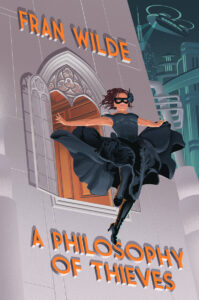If you’re hosting a literary dinner and want quick tinder to start a fired-up dinner table discussion among your guests, you have a number of options… the correct pronunciation of gif, the actual wordcount of a novella, and who is/was the greatest crime writer of all time, among them.
But ask writers and readers what the differences are between a heist and a caper, and you’ll find yourself at the table far longer than the last course.
As a multi-genre author whose latest book, A Philosophy of Thieves (Sept. 30, 2025) contains both heists and capers, I’ve chosen to stand firmly on both sides of the line.
Capers, for me, are lighter entertainments with a variety of tools and outcomes. Heists are more serious, usually comprising the movement of precious items from one place to another, and the stakes are higher. Neither is intended to be as physically dangerous as a robbery (where body bags are possible). Both require meticulous planning, and both — as literary constructs — invite the reader to play along as the plan goes awry for the main characters.
To help me balance my somewhat sideways take, I’ve asked three crime-writing friends what they think the differences are between heists and capers. I am very grateful to authors Alma Katsu, Jon McGoran, and Jonathan Maberry, for their answers.
Alma Katsu:
“I think of heists as stealing and capers encompassing a broader range of activity. It could be a heist but it could also be mischief: pulling an elaborate prank, or deceiving someone into thinking something else is going on. Both words are really playful, aren’t they? Heists make you think of armed gunmen, getaway drivers, maybe a hacker to help you bypass security systems, whereas the skills needed for any particular caper are limitless. In terms of the spy world, a lot of operations might be considered capers: smuggling people in or out, passing in counterfeit material, running a psyops or disinformation campaign.”
Alma’s newest book, FIEND, published on September 16, 2025.
Jonathan Maberry:
“Heists, in my view, are complex, meticulous, and sophisticated criminal plots to steal something of great value –a robbing a high-end bank, stealing a classic jewel from a museum, breaking into a secret facility to steal critical information. That sort of thing. Could be criminal or it could be a rogue team of do-gooders (e.g. The Ocean’s 11 series, Reservoir Dogs, Ronin, Sneakers, the Mission: Impossible series, The Thomas Crown Affair, etc.). The focus seems to be on the process of building the team, preparing, and then executing the crime. Character development seems hinged on the unique skills of each member of the team.
Whereas a ‘caper’ could be any moderately complex plan undertaken to accomplish a goal or make a point (the popcorn payoff in Real Genius, any given episode of Burn Notice or Leverage, Fantastic Mr. Fox, Office Space, Going in Style, Ant Man, etc.). Character development –and the presence of a wide range of unique ‘character’ types’– stands out in caper films. They are not always criminal and they are often slanted toward comedy.”
Jonathan’s latest published works are BURN TO SHINE (St. Martin’s Griffin), the 14th in his bestselling Joe Ledger thriller series, which is now in development for TV by the director of John Wick) and COLD WAR (Weird Tales Presents, a Blackstone imprint) book 2 of his NecroTek trilogy.
Jon McGoran:
“In my mind, a heist is an elaborate theft—which could be stealing or recovering—usually involving a cast of characters selected for their unique skills: the safe cracker, the hacker, the getaway driver, the demolitions expert, etc. A caper is broader, possibly involving theft, but it also could be a con or grift, or some other elaborate prank or ploy. “Caper” has a certain lighthearted connotation, so you generally wouldn’t include a murder. Heists can also have a lighthearted tone, but not necessarily. Neither genre is technically a mystery, since in both cases the protagonists are the perpetrators and generally the reader is privy to the planning and execution, but heists can be more thriller-esque, while capers can have cozier tone.
I find heists most fun on film, and my favorite is Ocean’s Eleven (2001); such a great, likeable cast, an ingenious plan, and a really fun tone.”
Jon’s latest book is The Price of Everything, which you can read about at http://www.jonmcgoran.com.
*


















